
The river Ticino is the most important perennial left-bank tributary of the Po. It has given its name to the Swiss canton through which its upper portion flows.

The Trebbia is a river predominantly of Liguria and Emilia Romagna in northern Italy. It is one of the four main right-bank tributaries of the river Po, the other three being the Tanaro, the Secchia and the Panaro.
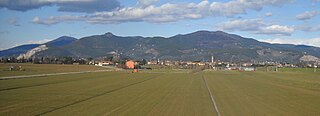
The province of Pisa is a province in the Tuscany region of Italy. Its capital is the city of Pisa. With an area of 2,448 square kilometres (945 sq mi) and a total population of 421,642, it is the second most populous and fifth largest province of Tuscany. It is subdivided into 37 comuni.

The Dora Riparia is an alpine river, a left-bank tributary of the Po. It is 125 kilometres (78 mi) long, with a 1,231 square kilometres (475 sq mi) drainage basin. It originates in the Cottian Alps, close to the Col de Montgenèvre in France, where it is called the Piccola Dora. Its name becomes the Dora Riparia after the confluence with the Ripa in the Argentera Valley and the Thuras de Bousson close to Cesana.
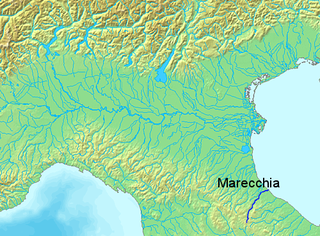
The Marecchia is a river in eastern Italy, flowing from near Monte dei Frati in the province of Arezzo, Tuscany, to the Adriatic Sea in Rimini, Emilia-Romagna. Along its course, the river passes next to or near the settlements of Novafeltria, Verucchio, and Santarcangelo di Romagna. It passes near the Republic of San Marino. Among its tributaries are the San Marino river and the Ausa.

Montecatini Val di Cecina is a small hilltown and comune in the province of Pisa in Tuscany. Located approximately 60 kilometres south of Pisa, the medieval town sits on the Poggio la Croce hill overlooking the Cecina Valley and the larger hilltown of Volterra, which lies just 15 km away.

The Serchio is the third longest river in the Italian region of Tuscany at 126 kilometres (78 mi), coming after the Arno at 242 kilometres (150 mi) and the Ombrone, 161 kilometres (100 mi). By mean rate of flow, it is the second largest, smaller than Arno but larger than Ombrone.

The Tagliamento is a braided river in north-east Italy, flowing from the Alps to the Adriatic Sea at a point between Trieste and Venice.
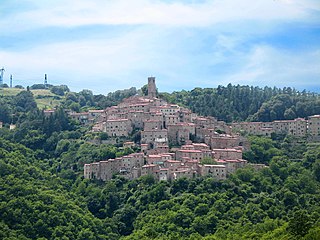
Castelnuovo di Val di Cecina is a comune (municipality) in the Province of Pisa in the Italian region Tuscany, located about 70 kilometres (43 mi) southwest of Florence and about 70 km southeast of Pisa.
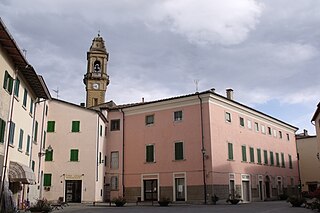
Pomarance is a comune (municipality) in the Province of Pisa in the Italian region Tuscany, located about 60 kilometres (37 mi) southwest of Florence and about 60 km southeast of Pisa.

The Grana del Monferrato is a small Italian river, classified as a torrente, a right tributary of the Po, which runs almost entirely in the Province of Alessandria among the hills of the Basso Monferrato which lie between the Po to the north and the Tanaro to the south. Notwithstanding its modest flow, it is the most significant Po tributary of the Basso Monferrato in terms of its length, the extent of its drainage basin and its discharge.
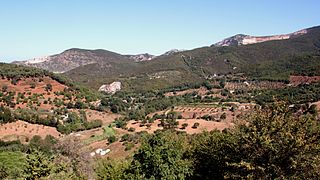
The Colline Metallifere, or the Metalliferous Hills, are a mountain-hill group in the Tuscan Antiapennine, in central Italy. They occupy the central-western part of Tuscany, divided between the provinces of Livorno, Pisa, Siena and Grosseto.
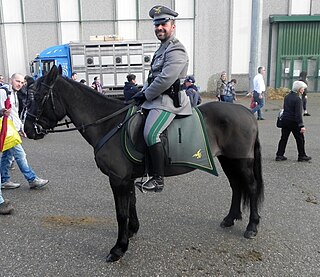
The Monterufolino or Cavallino di Monterufoli is a breed of small horse originating in the province of Pisa, in the Tuscany region of Italy. It is one of the fifteen indigenous horse "breeds of limited distribution" recognised by the AIA, the Italian breeders' association. It takes its name from a former farm estate, the "Tenuta di Monterufoli", now broken up, which covered some 4000 Ha in the comuni of Pomarance, Montecatini Val di Cecina and Monteverdi Marettimo.

The Germanasca is a 27 km (17 mi) Italian torrent, which runs through the Metropolitan City of Turin. It is a tributary of the Chisone, into which it flows near Perosa Argentina. The valley formed by the river is known as Val Germanasca.
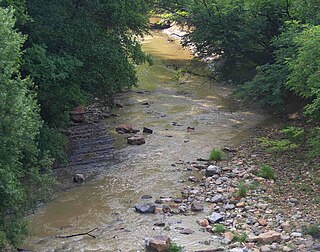
The Ostola is a 25 km long stream in the Piedmont region of north-western Italy. It's a left side tributary of the Cervo which flows through the Province of Biella.
The Pomarancina is a breed of domestic sheep from Tuscany in central Italy. It is raised mainly in the comune of Pomarance, from which it takes its name, and in the neighbouring comuni of Castelnuovo di Val di Cecina, Montecatini Val di Cecina and Volterra, all in the province of Pisa; some are kept in other parts of Tuscany, in the provinces of Grosseto, Livorno, Lucca and Siena. It is one of the forty-two autochthonous local sheep breeds of limited distribution for which a herdbook is kept by the Associazione Nazionale della Pastorizia, the Italian national association of sheep-breeders.

The Rovasenda is a 38 km long stream of Piedmont, in north-western Italy. It's a left side tributary of the Cervo which flows through the provinces of Biella and Vercelli.

The Steria or Cervo is a 9.6-kilometre (6.0 mi) stream of Liguria (Italy).
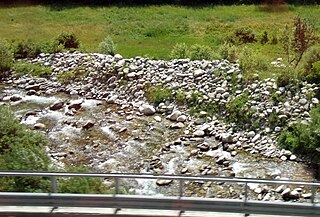
The Vermenagna is a 27.1-kilometre (16.8 mi) long river in northwestern Italy (Piedmont).
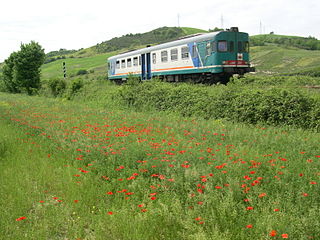
The Cecina-Volterra railway line is an Italian railway line that connects the coast town of Cecina to Saline di Volterra in Tuscany. Until 1958 it continued up into the medieval hilltop town of Volterra.




















